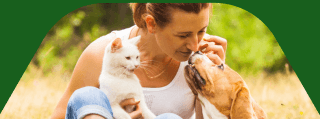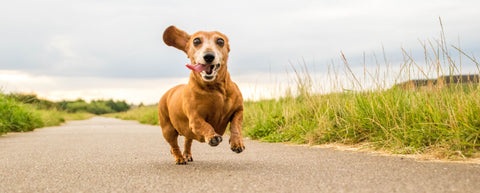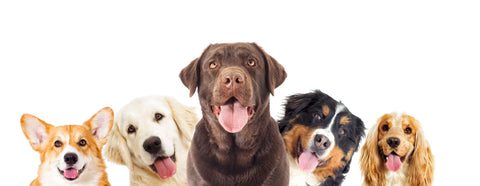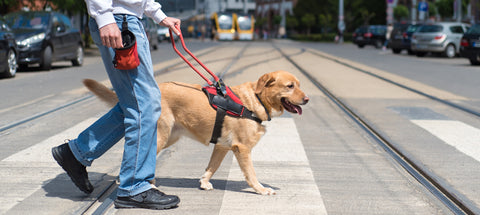Why do dogs jump up?
Playfulness? Dominance? Fear? Let’s find out.

Why does your dog jump up?
When a dog jumps up, it can really divide people into one of two camps. The first, don’t mind if a dog jumps up. Imagine they’ve just got home, they open the door, and their beloved pooch jumps up to greet them - they’re probably delighted. On the other paw, the second camp don’t like it if a dog jumps up. Imagine a dog who jumped up to them when they’re covered in dirt after a good long splash in a puddle – group two would be less than thrilled.
It can also be a very different feeling depending on who’s dog is doing the jumping. If someone else’s dog comes lurching towards you to decorate your jeans with their paw prints, you’re probably not going to pat them on the head and offer them a treat. Whereas when it’s your pooch, it’s part and parcel of being a pet parent.
Puppy jumping
So why is it that your dog jumps up? This behavior begins when they’re a puppy. When they spot their mom bringing food to the litter, they jump up and lick her face as a way to ask her to drop the food.
Jumping up is also a natural way for puppies to say hello. It gives them the chance to greet each other nose to nose and find out what their siblings have been up to, using their powerful sense of smell. So, although it may seem unusual for us, for dogs it’s a natural thing to do.
Train them early
Why is it best to train a dog early? Well, you know the saying – you can’t teach an old dog new tricks. And while that’s not quite true, it’s so much easier to train dogs when they’re puppies.
Also, you’ll be doing yourself and the world of dogs a favor. Don’t forget, some people are scared of dogs. By encouraging your dog not to jump up, you’ll make it easier to take your pooch out in public without annoying or frightening other people.
Teach your pup not to jump
Every time you interact with your puppy, you’re teaching them what you do and don’t like. So if you laugh and lavish them with love when they jump up at you, naturally enough, they’ll assume this is something they should do as often as possible. After all, a dog basically wants to make you happy.
The most popular training trick to stop your dog from jumping up is simply to turn your back on them as soon as those front paws leave the ground.
When your dog realises that you ignore them when they jump up, and that they’re no longer rewarded for that behavior, they’ll stop pretty quickly. However, as with any training technique, consistency is key. Make sure that your family and any visiting friends do the same to reinforce the behavior that you’re trying to encourage.
Treating a greeting disorder
As your pup grows up, unless you tell them not to, they’ll carry on jumping up as a way to say: “Hi, I’m here!” This is known as a greeting disorder.
Don’t shout at your dog or push them away when they jump up. A reward will get you further than punishment.
Ideally, you will train your puppy when they’re young, but it’s never too late to teach a dog how you want them to behave. It is possible but it just takes a little longer.
Here are a few approaches to try:
- The ‘turn your back’ approach described above.
- Ignoring your dog when they jump up. Don’t look at them, don’t engage, don’t say anything. Just carry on with what you were doing before.
- The distraction technique. Have your dog’s favorite toy to hand and involve them in a game to stop them from jumping up. You’ll need to be quick to distract them before they jump.
- Rewarding your dog with a treat if they sit quietly and behave calmly when friends and family arrive.
Why else do dogs jump up?
Dogs don’t always jump up because they’re excited to see you. Some dogs jump up because they’re afraid or because they’re trying to dominate the situation. So how can you tell what’s going on in that doggy brain?
“I’m scared”
Fear is one of the least likely reasons for your dog jumping up. But if your dog doesn’t normally jump up and they suddenly do, it’s worth thinking about what might have caused that behavior.
It could be because they’re spooked by something – a sudden loud noise or a dog that they don’t like the look of.
Do what you can to calm your dog down and reassure them that there’s nothing to be scared of. If they’ve reacted to another dog, take them away from the situation. If your dog is often anxious, consider a calming supplement. And if the behavior persists, take your dog to the vet to put your mind at rest.
“I’m top dog”
Dogs can also jump up because they want to show you who’s boss. We all love our pooches, but we have to be in control. Otherwise, their dominant behavior can upset, irritate and annoy both you and other people.
In this case, when it comes to training needs you’ll need to focus on encouraging your dog to respect you, your rules and your boundaries.
Show your dog that you’re in control by owning your space. If your dog jumps up at you, step sideways. You can also address the underlying issue of showing your dog who’s boss by, for example, making them wait by a doorway so you can walk through it first.
If your dog is showing signs of aggression such as biting or snarling, address this immediately and ask your vet or an animal behaviorist for advice.
Jumping and your dog’s joints
When your dog jumps up and down, it also has an effect on their joints.
When your dog jumps up:
- Their weight shifts into the large muscles in their back legs and onto their back leg joints.
- The supporting muscles and back leg joints send your dog upwards and forwards.
- And on landing, the front legs are mobilised, flexed and extended to act as a brake.
And when your dog jumps down:
- Your dog uses their body weight to create downward momentum.
- When they land, they ‘brake’ using the front of their body, putting extra stress on their front legs and shoulders.
- Jumping down takes less muscular work than jumping up, but when your dog puts on the brakes, they run the risk of a twist or strain.
Jumping can increase the load on your dog’s body and lead to your dog developing stiff joints. If this happens, you might want to give your adult dog a joint supplement such as YuMOVE, which is clinically proven to aid stiff joints and mobility.











